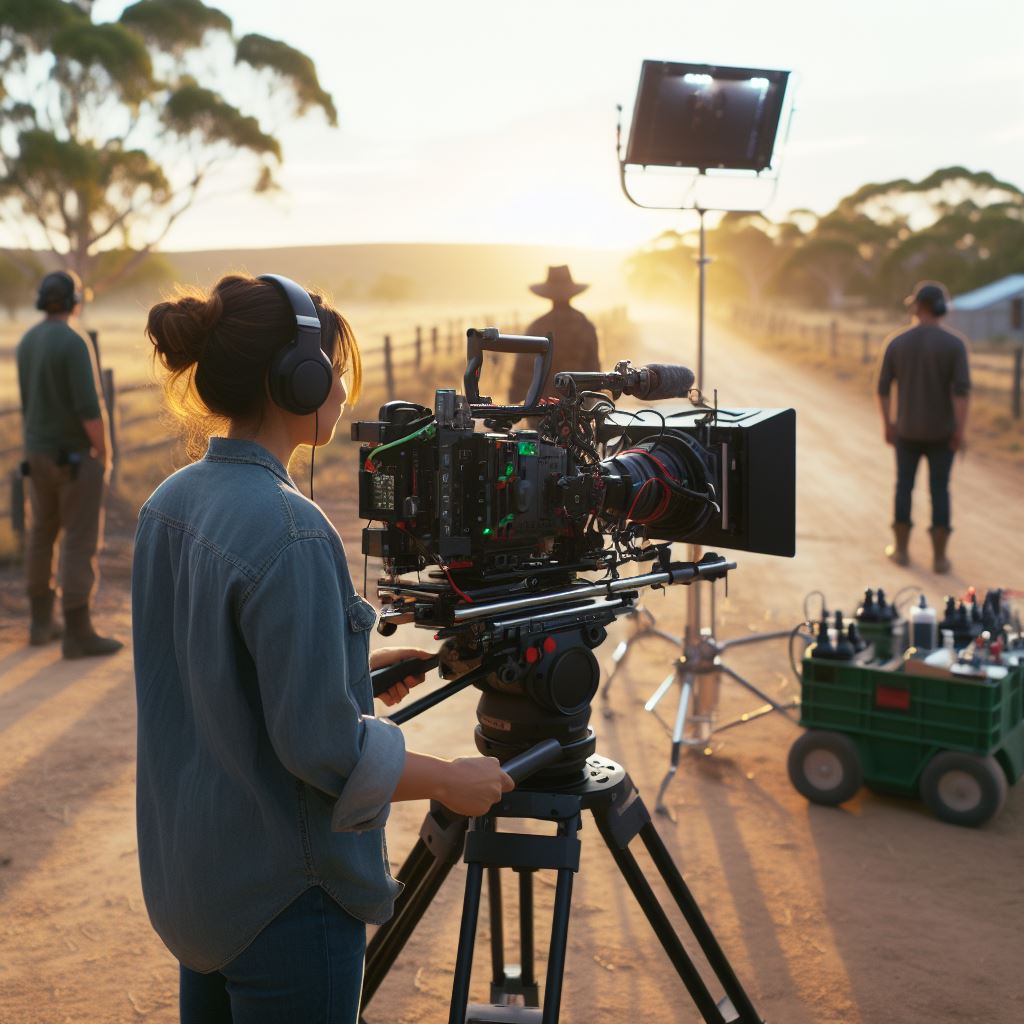Introduction
Welcome to our blog post on navigating the Aussie film industry, where we aim to provide invaluable insider tips for aspiring individuals. Understanding the industry is crucial for achieving success in one’s career within this field.
The Australian film industry is a diverse and vibrant community, offering numerous opportunities for those with passion and talent. We understand that breaking into this industry can be challenging, which is why we are here to offer guidance and advice.
By delving into the intricacies of the Australian film industry, we hope to equip you with the knowledge and tools necessary to navigate this competitive landscape.
Whether you aspire to be an actor, director, producer, or any other role, understanding the inner workings of the industry is essential.
Throughout this blog post, we will explore various aspects of the Aussie film industry, including networking, creating a standout portfolio, and finding the right opportunities. These insider tips will help you navigate the industry with confidence, increasing your chances of success.
Furthermore, we will discuss the importance of continuously evolving and broadening your skillset in order to stay relevant in this ever-changing industry. Aspiring individuals must be adaptable and willing to learn in order to thrive.
Join us on this journey as we unlock the secrets of the Aussie film industry and empower you to realize your dreams of a successful career in this exciting and dynamic field. Stay tuned for our upcoming sections that delve deeper into each aspect of navigating the Australian film industry
Understanding the Aussie Film Industry
Overview of the Australian film industry’s history and significance
- The Australian film industry has a rich history dating back to the silent film era.
- It gained international recognition in the 1970s with the emergence of the Australian New Wave.
- Aussie films like “Picnic at Hanging Rock” and “Mad Max” showcased unique storytelling and cinematic techniques.
- The industry plays a significant role in shaping Australia’s cultural identity and promoting local talent.
- Australian films often explore challenging social issues and reflect the country’s diverse landscapes and cultures.
The growth and development of the industry in recent years
- In recent years, the Australian film industry has experienced a resurgence and increased production levels.
- The introduction of government funding programs, such as Screen Australia, has supported the industry’s growth.
- Australia’s attractive film incentives and diverse shooting locations have also attracted international productions.
- The rise of streaming platforms has provided more distribution opportunities for Australian filmmakers.
- The industry has embraced digital technologies, allowing for innovative storytelling and production methods.
Achievements and contributions of Aussie filmmakers:
- Australian filmmakers have received international acclaim and awards for their work.
- Directors like George Miller, Baz Luhrmann, and Peter Weir have achieved global success.
- Actors such as Cate Blanchett, Nicole Kidman, and Hugh Jackman have become international stars.
- Australian films have made a significant impact at prestigious film festivals, including Cannes and Toronto.
- The industry has produced influential films that have sparked important conversations and influenced cinematic trends.
In general, the Australian film industry has a rich history and holds great significance in shaping the country’s cultural identity. In recent years, it has experienced growth and development, thanks to government support and the rise of streaming platforms.
Aussie filmmakers have achieved notable achievements and made significant contributions to the global film industry. Their work continues to inspire and entertain audiences worldwide.
Types of Opportunities in the Aussie Film Industry
Are you passionate about the Australian film industry and looking for ways to get involved? In this section, we will explore the various avenues available for individuals interested in the industry and discuss opportunities in film production, directing, acting, screenwriting, and more.
Film Production
For those inclined towards behind-the-scenes work, film production offers exciting opportunities. You can start as a production assistant, gradually working your way up to positions such as production coordinator, line producer, and even producer.
In film production, it is crucial to be organized, detail-oriented, and have excellent communication skills. Building a strong network of industry professionals can also open doors to future projects.
Directing
Directing is a coveted role in the film industry, and many aspiring filmmakers aim to become directors. To pursue a career in directing, you can start by creating short films, music videos, or even commercials. This helps showcase your talent and vision to potential employers.
Networking plays a vital role in directing as well. Attending film festivals, joining filmmaker communities, and participating in networking events can help you meet industry professionals who can offer guidance and opportunities.
Acting
If you have the passion and talent for performing, acting in the Aussie film industry could be your calling. Auditioning for roles in films, television shows, and theater productions is the primary way to get noticed and land acting opportunities.
Actors should also consider taking acting classes, joining local theater groups, and building a portfolio of their work. Networking is essential for actors as well, as it increases their chances of being recommended for roles or getting representation from talent agents.
Your Personalized Career Strategy
Unlock your potential with tailored career consulting. Get clear, actionable steps designed for your success. Start now!
Get StartedScreenwriting
For those with a knack for storytelling, a career in screenwriting can be immensely rewarding. Developing a strong portfolio of original scripts is crucial in this field. Consider entering screenwriting competitions or seeking feedback from industry professionals to improve your writing skills.
Building connections with producers, directors, or production companies willing to read your scripts is key. Attending industry conferences and workshops can help you meet these potential connections and increase your chances of getting your work noticed.
Importance of Networking and Building Connections
Regardless of the avenue you choose, networking plays a vital role in navigating the Aussie film industry. Building connections with industry professionals can open doors to opportunities that may not be advertised.
Word-of-mouth recommendations, personal introductions, and networking events can all lead to exciting prospects.
Attending film festivals, industry conferences, and seminars is a great way to meet like-minded individuals and build relationships. These connections can provide invaluable advice, mentorship, and even collaboration opportunities.
To summarize, the Aussie film industry offers a wide range of opportunities for individuals passionate about filmmaking. Whether you’re interested in production, directing, acting, or screenwriting, building a network of connections is vital.
Take advantage of industry events, hone your skills, and pursue your dreams with determination.
Read: Music Production: A Guide for Aussies
Essential Skills and Qualifications
List of key skills and qualifications required to succeed in the Aussie film industry
- Strong storytelling abilities and scriptwriting skills to create engaging narratives.
- Proficiency in cinematography and a good eye for capturing visually stunning scenes.
- Knowledge of film production techniques and the ability to manage project timelines and budgets.
- Excellent communication and collaboration skills to work effectively with cast and crew.
- Understanding of film editing software and techniques to enhance the final product.
- Ability to handle multiple tasks and work under pressure to meet tight deadlines.
- Strong problem-solving skills to overcome obstacles during production.
- Adaptability and flexibility to adjust to changing circumstances on set.
- Good leadership qualities to guide and motivate the production team.
- Networking skills to establish connections within the industry and attract opportunities.
The Importance of Practical Experience and Formal Education
Practical experience in the Aussie film industry is crucial for aspiring professionals.
Being involved in real productions allows individuals to learn first-hand about various aspects of filmmaking and develop necessary skills.
Formal education, such as film school or film-related courses, provides a structured learning environment and a comprehensive understanding of the industry.
Combining practical experience with formal education offers a holistic approach to skill development and increases the chances of success in the industry.
Practical experience allows individuals to apply the knowledge gained through formal education, enabling them to refine their craft and build a strong portfolio.
It also helps in making valuable connections within the industry, which can lead to future collaborations and job opportunities.
The Significance of Continuous Learning and Staying Up-to-Date with Industry Trends:
In the fast-paced and ever-evolving Aussie film industry, staying up-to-date with the latest trends and advancements is crucial.
Continuous learning ensures that professionals are equipped with the skills and knowledge required to navigate changing industry landscapes.
Keeping a finger on the pulse of industry trends allows filmmakers to stay relevant and meet the demands of audiences.
It enables them to embrace new technologies, techniques, and storytelling methods, enhancing their ability to create compelling content.
Additionally, being aware of industry trends helps professionals identify potential gaps in the market, enabling them to seize new opportunities and stay competitive.
To stay up-to-date, filmmakers can attend industry conferences and seminars, participate in workshops, and engage with online platforms dedicated to film industry news.
It is also essential to maintain an active network of industry professionals, as they can provide valuable insights and information.
All in all, succeeding in the Aussie film industry requires a combination of skills, practical experience, formal education, and a commitment to continuous learning.
By honing their craft, staying informed, and embracing industry trends, aspiring filmmakers can increase their chances of thriving in this competitive field.
Read: Australian Music Awards: A Closer Look
Navigating the Australian Film Industry
Embarking on a career in the Australian Film Industry as a newcomer can be both exhilarating and challenging.
To pave the way for a successful entry, consider these comprehensive tips that encompass strategic planning, the importance of a compelling portfolio, the art of relationship-building, and the significance of finding mentors in the industry.
Strategic Entry Tips
Navigating the intricacies of the Australian film scene requires a strategic approach. Immerse yourself in the industry by attending events, film festivals, and networking opportunities.
Social media platforms can serve as powerful tools for connecting with professionals, staying informed about industry developments, and establishing an initial presence.
Showcasing Your Talents
A strong portfolio or showreel is your visual calling card. Craft a compelling compilation that highlights your versatility, technical proficiency, and artistic flair.
Tailor your showcase to align with the specific niche or genre you aspire to enter, ensuring it leaves a lasting impression on potential employers or collaborators.
Significance of a Strong Portfolio
Your portfolio is a dynamic representation of your skills and creative identity. Populate it with a diverse range of projects that underscore your unique strengths.
Showcase your proficiency in various aspects of filmmaking, making your portfolio a testament to your potential as a valuable contributor to the industry.
Building Relationships
Genuine relationships are the cornerstone of a successful career in the film industry. Attend industry mixers, workshops, and seminars to foster connections with professionals.
Cultivate a sincere interest in others’ work, as authentic relationships can open doors to collaborations, mentorships, and unforeseen opportunities.
Stand Out with a Resume That Gets Results
Your career is worth more than a generic template. Let us craft a resume and cover letter that showcase your unique strengths and help you secure that dream job.
Get HiredFinding Mentors
Seek guidance from seasoned professionals by actively seeking mentors within the industry. Approach potential mentors respectfully, expressing your eagerness to learn from their experiences.
Mentorship not only provides invaluable insights but also offers a supportive network that can significantly accelerate your career growth.
Networking Strategies
Networking is an ongoing process that requires persistence and a proactive approach. Utilize online platforms like LinkedIn to expand your professional network.
Attend industry-specific events, introduce yourself, and articulate your passion for contributing to the industry. Consistent and genuine networking can yield fruitful connections.
Internships and Volunteering
Consider internships or volunteer opportunities to gain practical experience. Hands-on involvement not only enhances your skills but also familiarizes you with the dynamics of the industry.
Many successful professionals commenced their careers through internships, with such experiences often leading to permanent roles.
Continuous Learning
Stay abreast of industry trends and technological advancements by enrolling in workshops, courses, or online programs. A commitment to continuous learning demonstrates your dedication to growth and adaptability in the ever-evolving landscape of the film industry.
In fact, breaking into the Australian Film Industry demands a multi-faceted approach that combines strategic planning, a compelling portfolio, relationship-building, and mentorship.
With persistence, a proactive mindset, and a commitment to continuous learning, newcomers can navigate the industry landscape with confidence, making a lasting impact on Australia’s vibrant film scene.
Read: Building a Music Career in Australia

Delve into the Subject: Top 10 Australian Photographers to Follow in 2024
Resources for Success
In order to navigate the Aussie film industry successfully, it is crucial to have access to helpful resources. Here is a list of resources that can be beneficial for individuals looking to make their mark in the industry:
Industry Organizations
- Screen Australia: The national funding and support agency for the Australian screen industry.
- Australian Directors’ Guild: An organization dedicated to promoting and supporting Australian directors.
- Screen Producers Australia: Represents the interests of screen production businesses and professionals.
- Australian Writers’ Guild: Supports and advocates for Australian film and television writers.
Film Festivals
- Sydney Film Festival: Features a diverse range of films, including both Australian and international productions.
- Melbourne International Film Festival: Showcases innovative and thought-provoking films from around the world.
- Adelaide Film Festival: Celebrates the best of Australian and international screen culture.
- Tropfest: The largest short film festival in the world, known for discovering emerging talent.
Online platforms for networking and showcase purposes
- ScreenHub: An online community for professionals in the creative industries, including film and television.
- Filmink: Provides news, reviews, and interviews related to Australian and international films.
- FilmFreeway: An online submission platform for film festivals, allowing filmmakers to submit their work easily.
- Vimeo: A popular video-sharing platform where filmmakers can showcase their work and connect with others.
Industry events and workshops
- Australian International Documentary Conference: A major event for documentary filmmakers, producers, and broadcasters.
- Australian Film Television and Radio School (AFTRS): Offers a range of courses and workshops for aspiring filmmakers.
- Screenworks: A regional screen industry organization that provides networking events, workshops, and mentorship programs.
- St Kilda Film Festival: Hosts a range of events, including screenings, workshops, and panel discussions.
Attending industry events and workshops is essential for networking and gaining valuable insights into the Aussie film industry.
These gatherings provide opportunities to meet industry professionals, learn from experienced filmmakers, and showcase your work.
Building connections and staying updated with the latest industry trends are key to success in the competitive film industry.
Remember, success in the Aussie film industry requires determination, talent, and perseverance.
By utilizing these resources and actively participating in the industry, you can increase your chances of making a name for yourself and achieving your filmmaking goals.
In a nutshell, aspiring filmmakers should take advantage of the plethora of resources available to them in the Aussie film industry.
Join industry organizations, participate in film festivals, utilize online platforms, and attend events and workshops to maximize networking opportunities and showcase your talent.
With dedication and the right resources, you can navigate the Aussie film industry and succeed in your filmmaking career.
Good luck!
You Might Also Like: Touring Australia: A Guide for Musicians
Challenges and Opportunities in the Industry
When it comes to the Australian film industry, individuals face various challenges along their professional journeys. From funding issues to stiff competition, navigating this industry can be a daunting task.
However, amidst these challenges lie exciting opportunities that can shape the future of Australian cinema.
The common challenges faced by individuals in the Aussie film industry
One of the most common challenges faced by individuals in the Aussie film industry is securing sufficient funding for their projects.
Limited budgets and lack of financial support can hinder the production process, forcing filmmakers to get creative with their resources.
In addition to funding, competition within the industry is fierce.
With so many talented individuals vying for limited opportunities, it takes exceptional skill and perseverance to stand out.
Only the most resilient filmmakers can survive and thrive in this highly competitive environment.
Another challenge faced by filmmakers is the struggle to balance their artistic vision with commercial success.
While artistic expression is vital, the industry often demands commercial viability to ensure financial sustainability.
Finding the right balance between artistic integrity and market appeal can be a delicate tightrope walk.
Despite these challenges, the Aussie film industry also presents emerging opportunities that filmmakers can leverage to their advantage.
One significant opportunity is the growth of streaming platforms.
With the rise of platforms like Netflix and Amazon Prime, filmmakers now have an alternative distribution channel for their work, reaching a global audience without the limitations of traditional cinema releases.
International collaborations have also become a prominent avenue for Australian filmmakers to expand their reach.
Co-producing films with international partners not only provides access to greater resources but also opens doors to different markets and audiences around the world.
Moreover, technological advancements have revolutionized the way films are made and consumed.
Digital filmmaking has made production more accessible and affordable, empowering aspiring filmmakers to bring their visions to life.
Additionally, social media and online platforms have increased opportunities for self-promotion and audience engagement.
Emerging opportunities in the industry, such as the growth of streaming platforms and international collaborations
To navigate these challenges and make the most of the emerging opportunities, individuals in the Aussie film industry must adapt and continually evolve.
Building strong networks and collaborations can help filmmakers overcome funding constraints and expand their creative horizons.
Furthermore, staying updated with industry trends and embracing new technologies is crucial.
Being knowledgeable about the latest developments in streaming platforms, virtual reality, and online marketing can give filmmakers a competitive edge.
Generally, while the Aussie film industry presents its fair share of challenges, there are also exciting opportunities for those willing to explore them.
By overcoming funding issues, competing fiercely, and finding the right balance between artistic vision and commercial success, individuals can carve a successful path in this industry.
Embracing the growth of streaming platforms and international collaborations, as well as leveraging technological advancements, can open doors to a global audience and further enhance the Australian film industry’s impact.
Read: The Evolution of Australian Music Genres
Transform Your LinkedIn for Maximum Impact
Elevate your professional brand with a LinkedIn profile that attracts recruiters, showcases your expertise, and maximizes opportunities. Stand out in your industry with a profile built for success.
Boost ProfileConclusion
In this blog post, we have explored insider tips for navigating the Aussie film industry.
We have learned that understanding the industry is essential for success.
By knowing the key players, networking with industry professionals, and leveraging various resources, aspiring filmmakers can navigate the industry with confidence.
It is crucial to continually improve skills, embrace opportunities, and never give up on passion.
The Aussie film industry has a vibrant and unique landscape, and by taking action and pursuing their dreams, readers can make their mark in this dynamic industry.
So, go out there, chase your dreams, and make a name for yourself in the Aussie film industry!




